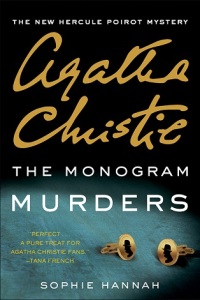 The Monogram Murders by Agatha Christie, Sophie Hannah
The Monogram Murders by Agatha Christie, Sophie Hannah Series: Poirot
Published by HarperCollins on September 9th 2014
Genres: British mystery, Mystery
Pages: 320
Format: Hardcover
Source: the library
Add to Goodreads

Also in this series: Hercule Poirot's Christmas
Also by this author: Hercule Poirot's Christmas, The Man in the Brown Suit, Partners in Crime, The Moving Finger
The bestselling novelist of all time. The world's most famous detective. The literary event of the year.
Since the publication of her first novel in 1920, more than two billion copies of Agatha Christie's novels have been sold around the world. Now, for the first time ever, the guardians of her legacy have approved a brand-new novel featuring Dame Agatha's most beloved creation, Hercule Poirot.
In the hands of internationally bestselling author Sophie Hannah, Poirot plunges into a mystery set in 1920s London – a diabolically clever puzzle sure to baffle and delight Christie's fans as well as readers who have not yet read her work. Written with the full backing of Christie's family, and featuring the most iconic detective of all time, this new novel is a major event for mystery lovers the world over.
The Monogram Murders is the first authorized mystery featuring Agatha Christie’s iconic Hercule Poirot. It’s an ingenious mystery with a fiendishly convoluted plot and something of the comfortable feeling of an Agatha Christie novel, that characteristic acknowledgement of human evil juxtaposed against an immovable faith in the triumph of goodness, justice, and right. And yet somehow, it never quite convinced me I was reading an Agatha Christie. There’s something about the narrative voice that is a little darker, a bit more psychological and less straightforward, than Christie’s typical style.
Sophie Hannah has not tried to add to the Hastings canon. Rather, she has created a new character, Edward Catchpool, who narrates portions of the story in first person, somewhat like Ariadne Oliver (The Pale Horse) or Colin Lamb (The Clocks.) Unlike his purely intellectual involvement in The Clocks, however, Poirot is an active participant in The Monogram Murders; Catchpool relates scenes for which he himself was not present in the third person, based upon Poirot’s account of the events.
Catchpool is a Scotland Yard detective, but a singularly reluctant one. He appears to be a reliable narrator, but is haunted by a traumatic experience involving a dead body in his childhood. That’s one of Hannah’s first and most obvious departures from Christie’s usual style; her first-person narrators are rarely that introspective or aware of their own psychology.
I don’t want to spoil the mystery plot for you, but it begins with a young woman apparently in fear for her life, proceeds to a multiple murder with several unusual features, and is set in both London and a small village – which Christie readers will know in advance is far from idyllic. What Christie readers may not expect is the degree of, for lack of a better phrase, abnormal psychology displayed by not one but many of the characters – not abnormal in the sexual sense (as writers of Christie’s era would have used the term), but in the sense of being unexpected and/or almost obsessive. Christie was hardly reluctant to give her characters strong motivations and sometimes unusual psychological twists, but rarely does she assign the latter to more than one or two characters per novel, so the prevalence of such characters in this novel feels not quite Christie-esque.
Hannah does have a good grasp of Poirot’s quirks and his precise, sometimes idiosyncratic speech. I could distinctly hear David Suchet’s voice delivering Poirot’s dialogue – a compliment to Hannah, since I consider Suchet’s portrayal to be the definitive Poirot. If anything, it is a slightly too-careful mimicry; it lacks a little of the joie de vivre of the original character. Still, at no point did I think, “oh, Poirot would not have said or done that.” Hannah reread all the Poirot mysteries before tackling this novel, and it shows in the care with which she portrays Poirot.
Sophie Hannah says of her own writing:
I tried to incorporate what I think of as all the crucial ingredients of a Christie/Poirot novel: a gleeful delight in storytelling; an outlandish/apparently impossible opening scenario that is later revealed to be eminently possible; the perfect combination of ease and pleasure for the reader with a challenging intellectual puzzle; a profound intelligence that at no point makes the reader feel stupid or condescended to; the centrality of motive and psychology; the combination of a light/feel-good experience for readers with a sophisticated awareness of the dark depravity of human beings. Christie, more than any other crime writer, is able to include polar opposites in her novels – light-dark, easy-difficult – without either ever detracting from the other.
In this aim, Hannah has succeeded admirably, with the possible exception of the first; “gleeful” is not quite how I would describe her relish for storytelling, though she is unquestionably a fine storyteller. She has certainly produced an intellectual puzzle married to an eminently readable narrative style, along with a plot full of enough twists and turns to rival the most convoluted of Christie’s own stories. It’s odd, then, that my overall reaction to the book is “very good, but not quite” – not quite Christie’s voice, not quite Christie’s style, not quite Christie’s plot (though every bit as ingenious.) As long as you go into it with the understanding that this is not (quite) an Agatha Christie novel, for all that it continues both her character and her traditions, I think you will enjoy it. I certainly did.


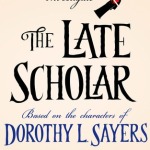



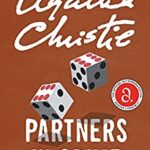
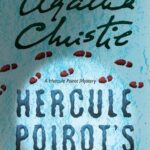

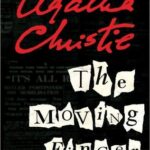

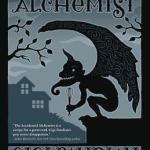


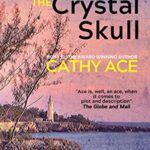







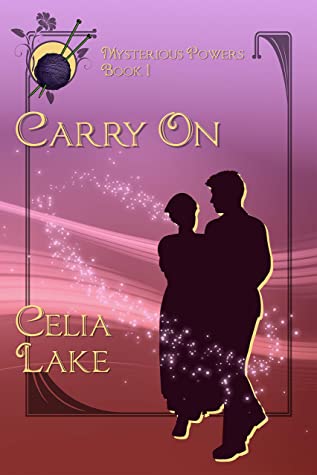


























Selah @ A Bibliophile's Style
Great review Lark! I’m doing my own re-reading of Poirot, and I’ve been torn about attempting this book, but I think I’ll give it a shot at some point.
Selah @ A Bibliophile’s Style recently posted…2015 Reading Challenges
Lark_Bookwyrm
It was good, just… not quite Christie, and I mean that in the sense of feel rather than of quality.